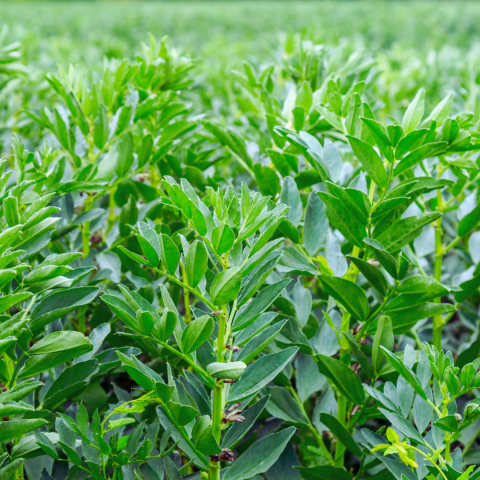Pulse crops, such as beans, have long held promise as a staple for sustainable farming. They are nutrient-dense, rich in protein and bring about a multitude of environmental benefits, through their natural nitrogen-fixing abilities, which help to improve soil health and reduce our reliance on chemical fertilisers.
However, beans and other pulses have traditionally been imported due to their intolerance to the UK’s unpredictable weather patterns. In recent years, this paired with rising exportation costs and growing environmental concerns, have led scientists to re-evaluate how we view this dependency.
What if the UK could produce its own pulses – resilient, nutrient-rich, and environmentally sustainable?
The answer lies in a cutting-edge scientific breakthrough: ‘Designer’ beans bred to thrive in British climates. Lincolnshire farmer, Andy Ward, alongside Agrii and the University of Warwick, are making these aspirations a reality by being early adopters of these bean varieties.
The Science of Adaptation
UK weather has historically presented a barrier to pulse cropping. Summer rains, paired alongside temperature variability have often led to inconsistent yields, deterring farmers from large-scale adoption of this practice. But now, science is promising to bridge this gap.
By using pioneering plant-breeding techniques, researchers are designing beans specifically tailored to withstand the unique challenges of UK summers. These crops are not only resilient, but also high yielding- turning what was once a prominent challenge into an opportunity for change.
The Knock-on Effects of Crop Innovation
The implications of these designer beans extend far beyond weather adaptation. By successfully cultivating pulses in the UK, scientists are embracing a new era for agriculture, in which crop diversity, health and sustainability efforts converge.
- Boosting Agricultural Resilience: Crop diversity is integral to a resilient farming system. A diversified crop rotation, including pulses, reduces dependency on singular crops and lowers the risk of large-scale failure due to pest and disease outbreaks. These designer beans could be key in strengthening agricultural systems against the uncertainties of climate change.
- Nutritional Aid: Beans are a high source of protein, fibre, and essential nutrients. By making pulses more readily available and making consumers more conscious of the options available to them, these innovations could improve public health, offering an affordable and sustainable dietary option that aligns with modern health-conscious trends.
- Sustainability and Soil Health: One of the most remarkable traits of beans is their ability to naturally fix nitrogen within the soil, unlike many of their counterparts. This reduces our reliance on inorganic chemical fertilisers, therefore curbing emissions and ensuring healthier ecosystems.
These ‘designer beans’ could become a pivotal tool in transitioning towards more sustainable farming practices, by reducing the emissions released in the UK agricultural sector. With successful seed harvesting trials occurring in 2023 – there are aspirational plans to scale up this production commercially, with an end goal of reaching our shelves by 2026.
Overcoming Challenges Through Science
The journey to this breakthrough has not been without its hurdles. Developing novel bean varieties that can withstand UK weather patterns required years of meticulous experimentation and collaboration across several disciplines. Scientists have leveraged genomics, data analysis and traditional agronomic techniques to accurately understand and manipulate the genetic makeup of pulses to ensure optimal performance. The results from the first successful harvest in 2023 therefore serve as a testament to the transformative power of science when applied to real-world problems and could pose a solution to climate variability here in the UK.
Unlocking a Future of Possibilities
The introduction of these beans is more than a solution to a single problem. It represents the potential of science to reshape the UK food system, transitioning toward greater self-sufficiency, sustainability, and health. As the UK’s first crop of homegrown designer beans emerges, it carries promise of a more ecologically resilient future, as well as bringing about economical benefits.
And we are just getting started!
With continued investment into research like this – and The NCS Project – the seeds of possibility for pulse cropping are becoming boundless. They serve as a symbol of what is possible when science and innovation meet reality.
Read more about these innovative pulses here:





